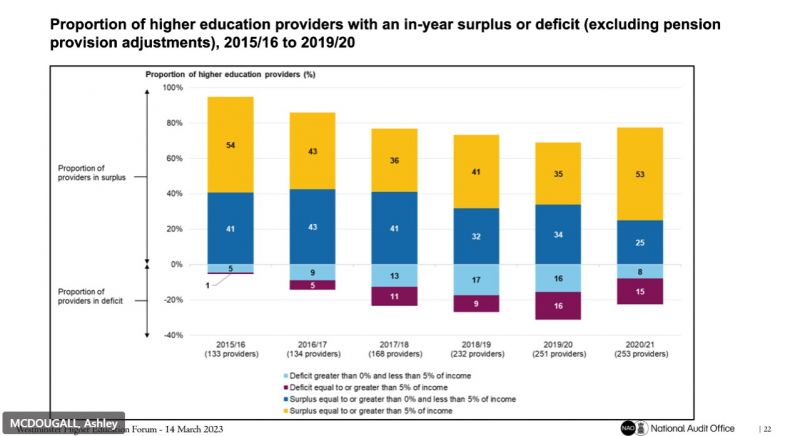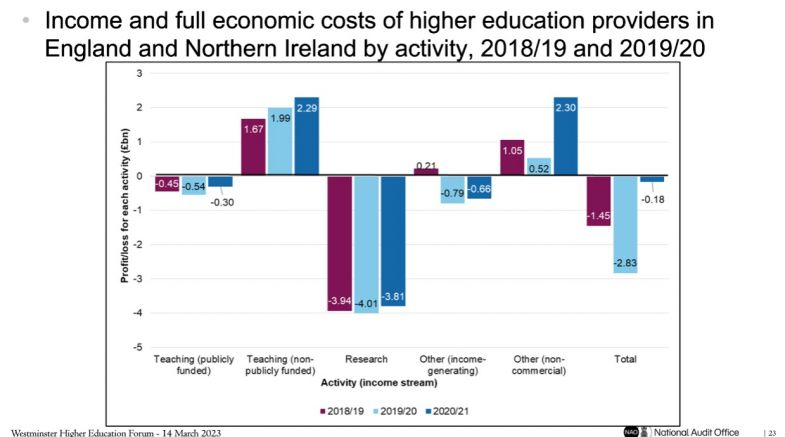Universities have reached the stage where budgets are only enough to cover their regulatory requirements, with research and innovation sure to suffer as a result, a sector leader has warned.
Jenny Higham, the vice-chancellor of St George’s, University of London, who is leading a review of the sector’s financial sustainability for Universities UK, said costs were mounting in several areas while the undergraduate fee income remained frozen.
“As a budget holder, I am nowhere near able to invest in the things that would be nice to do,” Professor Higham told a Westminster Higher Education Forum event on 14 March.
“I am, at the moment, operating where I stay out of prison, at the element of regulation only. Because the margins we operate on are getting smaller and smaller and trickling into deficit. That is the reality of what it feels like.
“In the end, the obvious answer to this is we are going to do less research and innovation…We cross-subsidise, and fundamentally, in the broadest terms, we can no longer afford that cross-subsidy.”
Professor Higham said she was a quarter of the way through her review, which has been labelled a “national conversation” about how to ensure the long-term sustainability of the sector.
She said universities had more than doubled the support on offer to students during the cost-of-living crisis, while having to deal with increased costs themselves, and there was also more funding required for areas such as mental health support.
The sector was also seeing a greater number of dropouts, she cautioned, noting that some of the cohort who gained entry to leading universities based on teacher-assessed grades during the pandemic appeared to be “struggling”, potentially because their marks had been “over-inflated”.
Other costs for universities included complying with health and safety legislation and the regulatory requirements of the Office for Students (OfS), who now “want returns twice a year, not once”.
“Perhaps everybody believes that is just pressing a button – it isn’t,” Professor Higham said. “It is staff that have to trawl through spreadsheets, have conversations to check the validity of the data. Each one of these things in themselves doesn’t seem very much; but in terms of taking up staff time, it can be enormous.”
Speaking at the same event, Ashley McDougall, the director for local service delivery and value for money at the National Audit Office – which oversees the OfS’ work on assessing financial sustainability – said that in 2020-21, the number of providers in deficit had actually shrunk compared with 2019-20: from a third to closer to 25 per cent after many came through the pandemic in a lot better financial state than expected.

The total deficit for the sector was nearly £3 billion, he said, with the cost of research the most significant loss maker.
This “stabilising” in finances, according to Mr McDougall, was mostly down to cost-cutting by universities, while donations and endowments had also seen an uptick.
He said this was not seen as a sustainable source of growth, especially as cuts might harm universities reputationally and affect future student numbers.
Institutions hoping that demographic changes in the coming years would help boost finances might be being overly optimistic, Mr McDougall cautioned.

He said Office for National Statistics figures point to about a 3 per cent increase in the number of 18- to 20-year-olds by 2024-25, but providers as a whole were projecting that UK student numbers would rise by 16 per cent.
Securing five times more students than the rate of population growth was “brave, in civil service speak, or optimistic”, he said.
Register to continue
Why register?
- Registration is free and only takes a moment
- Once registered, you can read 3 articles a month
- Sign up for our newsletter
Subscribe
Or subscribe for unlimited access to:
- Unlimited access to news, views, insights & reviews
- Digital editions
- Digital access to THE’s university and college rankings analysis
Already registered or a current subscriber?








